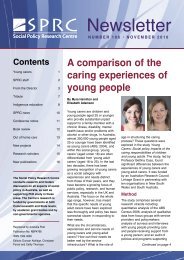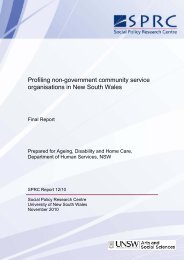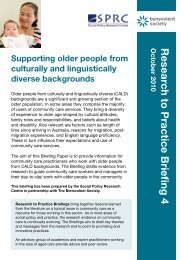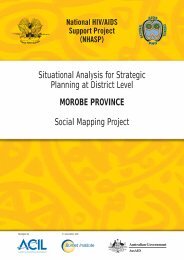A Strategic Assessment of the Children's Services Industry
A Strategic Assessment of the Children's Services Industry
A Strategic Assessment of the Children's Services Industry
- No tags were found...
Create successful ePaper yourself
Turn your PDF publications into a flip-book with our unique Google optimized e-Paper software.
STRATEGIC ASSESSMENT OF THE CHILDREN’S SERVICES INDUSTRYexpanded vision <strong>of</strong> ECEC currently being explored. They open up <strong>the</strong> possibility <strong>of</strong> agreedgoals being implemented within individual jurisdictions in ways that best fit <strong>the</strong> distinctivetraditions <strong>of</strong> individual States and Territories, allowing for innovation and experimentation atState and local levels.The successful models <strong>of</strong> integration, rural and remote service provision, partnership withstakeholders and parental and community engagement that already exist around <strong>the</strong> countrycould flourish and be extended within a framework that supports jurisdictions to find <strong>the</strong>irown path towards agreed goals and outcomes.1.4 Planning processes to ensure fair and equitable access to servicesEquitable access to early childhood education and care requires local planning within <strong>the</strong>context <strong>of</strong> national goals. Such planning will require mechanisms at State/Territory and,where appropriate, local government or regional levels. Effective planning depends uponaccurate, up-to-date and comprehensive data and <strong>the</strong> insights <strong>of</strong> knowledgeable and wellresourcedpolicy makers. The involvement <strong>of</strong> o<strong>the</strong>r ECEC stakeholders including parents,providers, staff and ECEC experts will streng<strong>the</strong>n <strong>the</strong> planning process and allow for <strong>the</strong> input<strong>of</strong> local knowledge about community needs.Australia’s reliance upon market mechanisms to develop new child care places has resulted ina rapid expansion <strong>of</strong> some service types, but it has not led to equitable access to servicesacross geographical areas or population groups. Indigenous children, children with specialneeds, children in rural and remote areas and those from culturally and linguistically diversebackgrounds do not access formal services at <strong>the</strong> same level as o<strong>the</strong>r children.1.5 Efficient deployment <strong>of</strong> resourcesEvery dollar <strong>of</strong> public and private expenditure on ECEC should be spent in <strong>the</strong> most effectiveway. Encouraging and resourcing small and independent ECEC providers to bring toge<strong>the</strong>rsome service functions would encourage greater efficiency at <strong>the</strong> local level. Depending upon<strong>the</strong> context, economies <strong>of</strong> scale could be achieved in <strong>the</strong> procurement <strong>of</strong> equipment, IThardware and s<strong>of</strong>tware and in some areas <strong>of</strong> human resource management (e.g. reliefstaffing). Aggregating services could create new employment opportunities and longer careerladders – both potentially useful strategies for recruitment and retention <strong>of</strong> staff. Savingsgenerated through such measures could be used to build service quality and enhancepr<strong>of</strong>essional development.Similar ideas (derived from o<strong>the</strong>r industries) could, potentially, be considered in relation tostaff training. In some jurisdictions, levies are imposed to create a pool <strong>of</strong> funds to supportupgrading <strong>the</strong> skills <strong>of</strong> workers. Measures <strong>of</strong> this type, perhaps funded from licensing fees,could be considered in relation to children’s services. Ano<strong>the</strong>r example comes from <strong>the</strong> UK,where a government-funded initiative, <strong>the</strong> Graduate Leader Fund, supports training andcontinuous pr<strong>of</strong>essional development within private, voluntary and independent early yearsservices.1.6 Support for parental engagementECEC services and programmes need to respect and acknowledge <strong>the</strong> role that parents play in<strong>the</strong>ir children’s development. Opportunities for parent engagement in service provision mustreflect <strong>the</strong> realities <strong>of</strong> <strong>the</strong> 21st century. Not all families seek, or value, direct input into <strong>the</strong>management <strong>of</strong> services. Never<strong>the</strong>less, parents should have opportunities for engagement in,and partnership with, ECEC services. Such opportunities should not be about compulsoryparticipation in management, but, ra<strong>the</strong>r, genuine opportunities to engage as partners in <strong>the</strong>vi
















